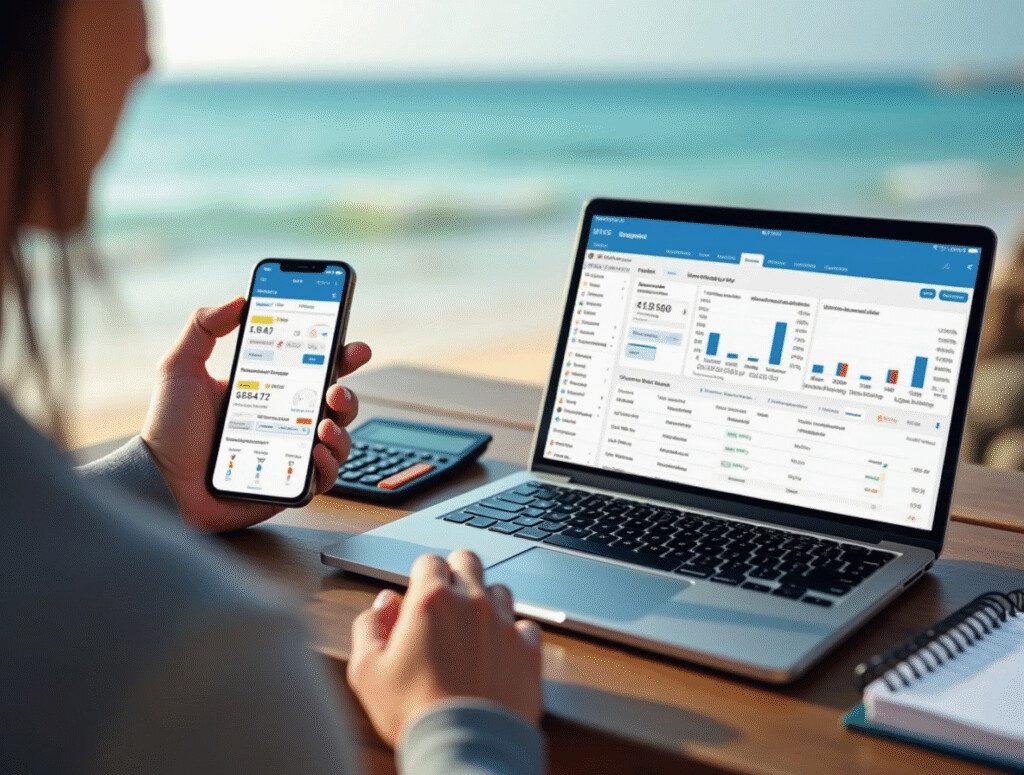Introduction: Embarking on Your Digital Nomad Journey
The freedom to work from anywhere while exploring the world has never been more accessible than it is now in 2025. Creating your first 6-month digital nomad roadmap is the essential first step to transforming your remote work dreams into a sustainable reality. This strategic planning process helps you navigate the logistical, financial, and personal challenges that come with location-independent living, setting you up for a successful transition into the digital nomad lifestyle.
Whether you’re a seasoned remote worker looking to take your career on the road or a traditional office employee wanting to break free from the 9-to-5 grind, a well-structured 6-month roadmap provides the framework needed to make informed decisions, prepare adequately, and minimize potential roadblocks. According to recent statistics, properly planned digital nomad transitions have a 78% higher success rate than impromptu relocations.
For those new to this concept, understanding what exactly a digital nomad is will provide crucial context before diving into the planning process. The digital nomad movement has evolved significantly over the past decade, with over 35 million location-independent professionals worldwide as of 2025.
In this comprehensive guide, we’ll walk you through exactly how to create your first 6-month digital nomad roadmap, from initial research and skill development to destination selection and community building. You’ll discover practical strategies for managing your finances, optimizing your work setup, and maintaining productivity while embracing the freedom and flexibility of nomadic living.
Phase 1: Research and Self-Assessment (Months 1-2)
The foundation of any successful 6-month digital nomad roadmap begins with thorough research and honest self-assessment. These first two months are crucial for gathering information, evaluating your skills, and determining what type of digital nomad lifestyle aligns with your goals and capabilities.
Evaluate Your Remote Work Potential
Before booking flights or researching destinations, assess whether your current skills and occupation are suitable for remote work. Many professionals get started as a digital nomad by leveraging their existing career expertise in a location-independent format.
“The most successful digital nomads are those who first take inventory of their marketable skills and identify how these can translate to remote opportunities.” – Sarah Chen, Founder of Remote Work Academy
Start by answering these critical questions:
- Is your current job conducive to remote work?
- Do you have specialized skills that are in demand for freelance or contract work?
- What income level do you need to maintain your desired lifestyle?
- How many hours per week do you realistically want to work?
- What time zone constraints might affect your ability to communicate with clients or employers?
Digital Nomad Skills Assessment Worksheet:
- List your top 5 professional skills
- Rate each skill’s remote work potential (High/Medium/Low)
- Identify gaps that need development before transition
- Research average remote compensation for each skill
- Determine which skills align best with your travel goals

Research Visa Requirements and Destinations
Creating your first 6-month digital nomad roadmap requires thorough understanding of visa options and destination suitability. The digital nomad visa landscape has expanded dramatically, with over 45 countries now offering specific visas for remote workers in 2025.
Consider these factors when researching potential destinations:
- Visa requirements and duration
- Cost of living relative to your income
- Internet reliability and speed
- Safety considerations
- Climate preferences
- Time zone compatibility with clients/employers
- Local digital nomad community
- Healthcare quality and accessibility
Comparative Destination Analysis:
| Factor | Southeast Asia | Latin America | Eastern Europe | Digital Nomad Hubs |
|---|---|---|---|---|
| Avg. Monthly Cost | $800-1,500 | $1,000-2,000 | $1,200-2,500 | $1,800-3,500 |
| Internet Quality | Variable | Good | Excellent | Excellent |
| Visa Ease | 30-90 day tourist | 90-180 day tourist | Digital nomad visas | Digital nomad visas |
| Safety | Generally good | Varies by country | Very good | Excellent |
| Nomad Community | Large | Growing | Established | Extensive |
Establish Your Financial Runway
Financial planning is a critical component of your 6-month digital nomad roadmap. Unlike traditional lifestyle changes, becoming a digital nomad often involves periods of income fluctuation, especially during the transition.
Create a comprehensive financial plan that includes:
- Emergency fund covering 3-6 months of expenses
- Startup costs (equipment, visa fees, initial accommodations)
- Monthly budget for each destination
- Tax planning strategy for international income
- Insurance costs (health, travel, equipment)
“A successful digital nomad roadmap always includes financial buffers. I recommend having at least three months of total expenses saved before embarking on your journey.” – Miguel Fernandez, Financial Advisor for Location Independent Professionals
Digital Nomad Financial Planning Template:
- Current savings: $_______
- Monthly remote income estimate: $_______
- Startup costs estimate: $_______
- Monthly budget by category:
- Accommodation: $_______
- Food: $_______
- Transportation: $_______
- Coworking: $_______
- Insurance: $_______
- Entertainment: $_______
- Miscellaneous: $_______
Phase 2: Skill Development and Remote Work Preparation (Months 2-3)
The second phase of your 6-month digital nomad roadmap focuses on developing the necessary skills and preparing your work situation for location independence. This preparation period is crucial for ensuring you have sustainable income while traveling.
Upskill for Remote Opportunities
Many aspiring digital nomads need to enhance existing skills or develop new ones to succeed in the remote job market. Your 6-month digital nomad roadmap should allocate time specifically for this purpose.

Popular remote work skills to develop include:
- Digital marketing (SEO, PPC, social media management)
- Web development and programming
- Content creation and copywriting
- Graphic design and UI/UX
- Virtual assistance and project management
- Online teaching and language instruction
- Consulting in your area of expertise
According to research from Oberlo’s digital nomad study, technical skills like programming and digital marketing consistently rank among the highest-paid remote professions, with average earnings 32% higher than non-technical remote roles.
Skill Development Action Plan:
- Identify 2-3 primary skills to focus on
- Research online courses and certification programs
- Allocate daily/weekly time for learning
- Set measurable milestones for skill acquisition
- Create sample projects for your portfolio
- Connect with mentors in your chosen field
Transition Your Work Arrangement
A critical component of your 6-month digital nomad roadmap involves either transitioning your current job to remote work or securing new remote income streams. This process typically requires careful planning and communication.
Options for Creating Remote Income:
- Negotiate remote work with current employer
- Find a fully remote position with a new company
- Develop a freelance business in your area of expertise
- Create digital products or online courses
- Build a location-independent business
- Combine multiple part-time remote opportunities
Each approach has distinct advantages and challenges:
| Remote Work Approach | Setup Time | Income Stability | Location Flexibility | Growth Potential |
|---|---|---|---|---|
| Remote Employee | Low | High | Medium | Medium |
| Freelancer | Medium | Medium | High | High |
| Digital Business Owner | High | Low to High | Very High | Very High |
| Multiple Income Streams | Medium | Medium | High | High |
When negotiating remote work with a current employer, preparation is key:
- Document your productivity metrics
- Create a detailed remote work proposal
- Suggest a trial period with clear deliverables
- Address potential concerns proactively
- Propose regular check-ins and communication protocols
“When I created my first 6-month digital nomad roadmap, I allocated six weeks specifically to finding clients before departure. This foundation of work made the transition much less stressful.” – Emma Rodriguez, Digital Nomad Coach
Setup Your Digital Infrastructure
Every successful 6-month digital nomad roadmap must include establishing the proper digital infrastructure to work effectively from anywhere. This involves both hardware and software considerations.
Essential Digital Nomad Equipment:
- Reliable laptop with sufficient processing power
- Noise-canceling headphones
- Portable backup charger/power bank
- External hard drive or cloud storage solution
- Smartphone with international capabilities
- Universal power adapter
- Portable WiFi device or hotspot
Software and Digital Services:
- Project management tools (Asana, Trello, ClickUp)
- Communication platforms (Slack, Zoom, Discord)
- Cloud storage solutions (Google Drive, Dropbox)
- VPN service for security
- Time tracking software if needed
- Accounting and invoice software
- Backup solutions
Pros and Cons of Lightweight vs. Comprehensive Setups:
Pros of Minimalist Setup:
- Easier mobility between locations
- Lower replacement costs if lost/stolen
- Less physical strain from carrying equipment
- Simpler setup in varied workspaces
Cons of Minimalist Setup:
- Potential productivity limitations
- Fewer backup options if equipment fails
- May require software workarounds
- Could limit types of projects you can accept
Phase 3: Logistics and Lifestyle Planning (Months 3-4)
The middle phase of your 6-month digital nomad roadmap focuses on practical logistics and lifestyle considerations that will support your success on the road. This planning phase transforms abstract ideas into concrete actions.
Accommodation and Workspace Strategy
Developing a strategy for finding suitable accommodations and workspaces is essential to your 6-month digital nomad roadmap. Your living and working environments significantly impact your productivity and overall experience.

Accommodation Options Comparison:
| Type | Cost | Community | Work Suitability | Commitment Level |
|---|---|---|---|---|
| Airbnb | Medium-High | Low | Variable | Flexible |
| Coliving Spaces | Medium | Very High | Excellent | Medium |
| Hostels | Low | High | Poor-Medium | Very Flexible |
| Monthly Rentals | Low-Medium | Medium | Good | Medium |
| House Sitting | Very Low | Low | Variable | Fixed Periods |
| Hotels | High | Low | Variable | Very Flexible |
When planning accommodations as part of your 6-month digital nomad roadmap, consider these factors:
- Proximity to coworking spaces or cafés
- Reliable WiFi (ask for speed tests before booking)
- Comfortable workspace within the accommodation
- Noise levels during working hours
- Access to amenities and conveniences
- Community aspects if important to you
- Flexible cancellation policies
Workspace Options Beyond Accommodation:
- Coworking spaces with daily/weekly/monthly passes
- Laptop-friendly cafés with reliable WiFi
- Public libraries in larger cities
- University campuses (sometimes accessible)
- Public parks with WiFi in digital nomad-friendly cities
- Hotel lobbies and business centers
Health and Insurance Planning
Creating your first 6-month digital nomad roadmap must include comprehensive health and insurance planning. This often-overlooked aspect can prevent significant financial and medical challenges while traveling.
Essential insurance considerations include:
- International health insurance with comprehensive coverage
- Travel insurance for trip cancellations and delays
- Equipment insurance for your technology
- Liability insurance depending on your profession
According to digital nomad insurance experts Safety Wing, comprehensive nomad insurance typically costs between $40-120 per month depending on coverage levels, age, and destinations.
Digital Nomad Healthcare Strategy:
- Research healthcare quality at each destination
- Identify English-speaking medical facilities
- Pack essential medications with proper documentation
- Create a list of necessary vaccinations by destination
- Develop a fitness routine adaptable to different locations
- Plan for mental health support while traveling
“When building your 6-month digital nomad roadmap, never compromise on health insurance. The peace of mind alone is worth the investment.” – Dr. Lisa Chang, International Health Consultant
Create Your Itinerary and Timeline
A well-structured itinerary is the backbone of your 6-month digital nomad roadmap. While maintaining flexibility is important, having a general framework helps with budgeting, visa planning, and work commitments.
Step-by-Step Itinerary Development:
Step 1: Select Your Primary Destinations
Begin by choosing 2-4 main destinations for your first 6 months, considering factors like cost, internet reliability, visa options, and personal interests.
Step 2: Determine Optimal Stay Duration
For each location, decide how long you’ll stay based on visa limitations, seasonal considerations, and personal preferences. Many digital nomads find that stays of at least 3-4 weeks per location provide the best balance between exploration and productivity.
Step 3: Research Transition Logistics
Plan transportation between destinations, including flight costs, travel time, and potential quarantine or entry requirements.
Step 4: Create a Visual Timeline
Develop a visual representation of your 6-month digital nomad roadmap using a digital calendar, spreadsheet, or project management tool.
Step 5: Build in Buffer Time
Allow flexibility by adding buffer days between major transitions for unexpected delays or opportunities.
Sample 6-Month Digital Nomad Roadmap Timeline:
| Month | Location | Accommodation | Visa Status | Key Activities | Work Projects |
|---|---|---|---|---|---|
| Month 1 | Chiang Mai, Thailand | Coliving space | Tourist visa (30 days) | Setup routines, explore city | Client project A |
| Month 2 | Chiang Mai, Thailand | Same coliving | Visa extension | Digital nomad meetups, explore region | Client projects A & B |
| Month 3 | Bali, Indonesia | Monthly villa rental | Tourist visa (60 days) | Establish beach/work balance | Client project B |
| Month 4 | Bali, Indonesia | Same villa | Same visa | Explore cultural sites, join nomad events | New client onboarding |
| Month 5 | Lisbon, Portugal | Airbnb apartment | Schengen entry (90 days) | European networking events | Major project launch |
| Month 6 | Lisbon, Portugal | Same Airbnb | Same Schengen | Evaluate next destinations | Client maintenance |
Phase 4: Community Building and Lifestyle Integration (Months 5-6)
The final phase of your 6-month digital nomad roadmap focuses on building connections and integrating work with travel for a sustainable lifestyle. This period transforms your journey from a temporary adventure into a viable long-term lifestyle.
Connect with Digital Nomad Communities
Building connections is a vital component of your 6-month digital nomad roadmap. Community support provides valuable resources, friendship, and professional opportunities.

Strategies for Building Your Nomad Network:
- Join location-specific digital nomad Facebook groups before arrival
- Attend coworking space events and workshops
- Use apps like Nomad List, Meetup, and Couchsurfing
- Participate in skill-sharing sessions and mastermind groups
- Volunteer for local causes to meet both locals and travelers
- Take part in digital nomad conferences and retreats
The value of community building extends beyond social benefits. According to a 2024 survey by Nomad List, digital nomads who actively participate in local communities report 42% higher satisfaction and 37% longer stays in their chosen destinations.
Digital Nomad Community Resources:
- Online platforms: Nomad List, Remote Year, WiFi Tribe
- Virtual communities: Digital Nomad Girls, Dynamite Circle
- Coworking networks: Impact Hub, Selina, Outsite
- Conference circuits: Running Remote, 7in7, Nomad Summit
- Location-specific Slack channels and Discord groups
- Professional communities in your specific field
Develop Sustainable Work-Travel Balance
Creating a sustainable balance between work productivity and travel experiences is perhaps the most challenging aspect of your 6-month digital nomad roadmap. This balance is essential for long-term success.
“The biggest mistake new digital nomads make is treating their journey like a vacation. Your 6-month digital nomad roadmap should explicitly schedule both work time and exploration time.” – James Wilson, 7-year digital nomad and productivity coach
Work-Travel Balance Strategies:
- Maintain consistent working hours across time zones
- Establish morning routines that ground your productivity
- Use time blocking to separate work periods from exploration
- Plan intensive work during weekdays, exploration on weekends
- Research destinations before arrival to minimize adjustment time
- Consider slow travel (longer stays) to reduce transition stress
- Use productivity tracking to ensure work output remains consistent
Pros and Cons of Different Working Schedules:
Pros of Fixed Schedule:
- Creates clear boundaries between work and leisure
- Helps maintain client/employer expectations
- Provides structure amidst changing environments
- Easier to collaborate with teams in specific time zones
Cons of Fixed Schedule:
- Less flexibility for spontaneous experiences
- May miss daytime activities in some locations
- Can be difficult to maintain across multiple time zones
- Might not align with optimal productivity periods
Evaluate and Adjust Your Roadmap
The final component of your 6-month digital nomad roadmap involves regular evaluation and adjustment. Successful digital nomads continuously refine their approaches based on experience.
Schedule monthly reviews of your situation, addressing these key areas:
- Financial health and income stability
- Work productivity and client satisfaction
- Physical and mental wellbeing
- Community connections and support network
- Destination satisfaction and future location planning
- Technology and equipment needs
- Skills development and career growth
Creating a comprehensive feedback system helps identify what’s working well and what needs adjustment:
Monthly Digital Nomad Lifestyle Assessment:
- Rate your satisfaction in key areas (1-10 scale)
- Document challenges faced and solutions developed
- Track expenses against budget projections
- Note productivity metrics and client feedback
- Assess work-life balance and stress levels
- Update your skills development progress
- Refine future destination criteria based on experience
Using data from these assessments, make informed adjustments to your ongoing digital nomad roadmap:
| Assessment Area | Indicators of Success | Signs Adjustment Needed |
|---|---|---|
| Financial | Meeting savings goals, stable income | Depleting reserves, income volatility |
| Productivity | Meeting deadlines, quality work | Missed deadlines, client concerns |
| Wellbeing | Energy, happiness, health | Fatigue, stress, illness |
| Community | Growing network, social satisfaction | Isolation, difficulty connecting |
| Location | Enjoying area, good infrastructure | Constant complaints, poor work conditions |
Essential Tools for Your 6-Month Digital Nomad Roadmap
Successfully implementing your 6-month digital nomad roadmap requires leveraging the right tools and resources. These digital solutions help manage everything from finances to productivity.
Financial Management Tools
Maintaining financial clarity is crucial when creating your first 6-month digital nomad roadmap. These tools help track income, expenses, and tax obligations across borders:
- Wise (formerly TransferWise): Multi-currency accounts with minimal exchange fees
- Revolut or N26: Digital banking with international features
- Quickbooks Self-Employed or FreshBooks: Income and expense tracking
- Mint or YNAB: Personal budgeting across currencies
- Taxfyle or Expat Tax Professionals: International tax guidance

Productivity and Work Management
Maintaining productivity while traveling is essential to your 6-month digital nomad roadmap. These tools help manage workflows and projects:
- Asana, Trello, or ClickUp: Project management and task tracking
- Toggl or Harvest: Time tracking for billable hours
- Focus apps like Forest or Freedom: Minimize distractions
- Google Workspace or Microsoft 365: Document collaboration
- Slack or Discord: Team communication
- World Time Buddy or Timezone.io: Manage time zone differences
- Krisp or Noise Blocker: Audio enhancement for calls in noisy environments
Travel and Accommodation Resources
These specialized platforms support the logistics portion of your 6-month digital nomad roadmap:
- Airbnb, Booking.com: Short-term accommodations
- Nomad Rental, Spotahome: Longer-term rentals
- Coliving platforms: Selina, Outsite, Roam
- Google Fi, Airalo: International phone/data service
- Skyscanner, Google Flights: Flight comparison
- Rome2Rio: Multi-modal transportation planning
- TrustedHousesitters: House sitting opportunities
- Workfrom, Coworker: Workspace discovery
According to independent research firm Nomadphile’s 2024 report, digital nomads who use specialized accommodation services spend approximately 23% less on housing compared to those using standard tourism platforms.
Common Challenges and Solutions in Your First 6 Months
Even the most carefully planned 6-month digital nomad roadmap will encounter obstacles. Anticipating common challenges helps you develop effective solutions before problems arise.
Productivity and Focus Issues
Many new digital nomads struggle with maintaining productivity while surrounded by new experiences and distractions.
Common Productivity Challenges:
- Irregular schedules disrupting work routines
- Environmental distractions in cafés or shared spaces
- Unreliable internet connections
- Time zone differences affecting communication
- Travel fatigue impacting focus and energy
Effective Solutions:
- Establish non-negotiable productive hours
- Create a portable “workspace toolkit” (noise-canceling headphones, portable monitor, etc.)
- Research backup internet options before arrival (local SIM cards, portable WiFi)
- Use productivity techniques like Pomodoro (25-minute focused work periods)
- Build travel buffer days between locations to prevent fatigue
“Creating your first 6-month digital nomad roadmap should include identifying your optimal productivity conditions and ensuring they can be replicated in each destination.” – Alejandra Gomez, Productivity Coach for Remote Workers
Loneliness and Cultural Adjustment
The psychological aspects of nomadic living present significant challenges that should be addressed in your 6-month digital nomad roadmap.
Social and Cultural Challenges:
- Isolation from familiar support networks
- Difficulty forming deep connections with constant movement
- Cultural adjustment and language barriers
- Missing important events back home
- Identity shifts and personal growth challenges
Effective Strategies:
- Schedule regular video calls with family and friends
- Join structured programs like coworking communities
- Learn basic phrases in local languages
- Establish a “home base” destination to return to periodically
- Consider therapy options specialized for expats and nomads
- Balance tourist activities with authentic local experiences
- Develop personal rituals that provide consistency across locations
Financial and Administrative Complexities
Administrative challenges often cause the most stress for those implementing their first 6-month digital nomad roadmap.
Common Administrative Challenges:
- International tax obligations
- Banking restrictions and currency issues
- Mail and document management
- Healthcare access across borders
- Insurance claims processes
- Visa extensions and immigration requirements
Practical Solutions:
- Consult with an international tax professional before departure
- Establish a virtual mailing service in your home country
- Digitize essential documents and store securely
- Maintain a home country address through family or services
- Research digital nomad-friendly banking options
- Create a detailed spreadsheet tracking visa requirements and stays
- Develop relationships with expat-friendly service providers
Beyond the First 6 Months: Long-Term Digital Nomad Success
While this guide focuses on creating your first 6-month digital nomad roadmap, successful nomads continuously evolve their approach for long-term sustainability.
Career Development and Income Growth
The most successful digital nomads prioritize ongoing career development:
- Regularly update your portfolio with recent projects
- Allocate time for learning new skills and obtaining certifications
- Network strategically within your industry, not just nomad circles
- Consider developing passive income streams
- Build authority in your niche through content creation
- Gradually increase rates as your expertise grows
- Explore opportunities for remote team leadership
Creating Home Bases and Slower Travel
Many experienced digital nomads transition from constant movement to a “slow travel” approach with periodic home bases:
- Select 2-3 favorite destinations as semi-permanent bases
- Rent longer-term accommodations (3-6 months) for stability
- Build deeper community connections in these locations
- Explore regions thoroughly rather than country-hopping
- Consider obtaining digital nomad visas for extended stays
- Create storage solutions for reducing constant packing
- Develop relationships with local service providers

Personal Growth and Lifestyle Sustainability
Successful long-term digital nomads integrate personal development into their lifestyle:
- Develop practices for maintaining physical and mental health
- Create systems for continuous learning and skill development
- Build relationships that transcend geographical boundaries
- Define success beyond location independence
- Contribute to local communities through volunteering or mentorship
- Establish financial goals beyond sustaining the lifestyle
- Create a vision for your ideal life 5-10 years ahead
How much money should I save before implementing my 6-month digital nomad roadmap?
Financial experts recommend having at least three months of total expenses saved as an emergency fund, plus your startup costs and first month’s expenses. For most digital nomads in 2025, this typically ranges from $5,000-$10,000 depending on your destinations and lifestyle preferences. Your 6-month digital nomad roadmap should include detailed budget projections to determine your specific number.
Should my first 6-month digital nomad roadmap include multiple countries or focus on one region?
For your first 6-month digital nomad roadmap, limiting yourself to 2-3 countries within the same region typically provides the best balance between exploration and productivity. This approach minimizes transition stress, reduces travel costs, and allows you to develop a deeper understanding of each location. Consider factors like visa policies, timezone compatibility, and travel distances when planning your itinerary.
What’s the biggest mistake people make when creating their first 6-month digital nomad roadmap?
The most common mistake is underestimating the importance of community and over-prioritizing destinations based solely on cost or aesthetics. Your 6-month digital nomad roadmap should emphasize locations with established digital nomad communities, especially for your first few months. These communities provide crucial support, networking opportunities, and practical knowledge that significantly increases your chances of success.
How do I maintain client relationships while traveling as part of my 6-month digital nomad roadmap?
Communication is key. Your 6-month digital nomad roadmap should include strategies for maintaining consistent availability during client business hours, overdelivering on projects during transitions, and being transparent about location changes. Utilize tools like Calendly for scheduling across time zones, and consider establishing weekly video check-ins with important clients to maintain relationships.
Can I create a 6-month digital nomad roadmap if I’m not in tech or marketing?
Absolutely! While tech and marketing are common digital nomad professions, successful location-independent professionals come from diverse backgrounds including education, healthcare consulting, creative fields, project management, customer support, and many others. Your 6-month digital nomad roadmap should focus on translating your specific skills to remote formats rather than changing careers entirely.
What type of accommodation should I prioritize in my first 6-month digital nomad roadmap?
For your first 6-month digital nomad roadmap, consider starting with coliving spaces or nomad-focused accommodations, especially in your first location. These environments provide built-in community, reliable workspaces, and opportunities to learn from experienced nomads. As you gain confidence, you can transition to independent apartments or other options based on your preferences and budget.
Conclusion: Implementing Your 6-Month Digital Nomad Roadmap
Creating your first 6-month digital nomad roadmap is both an exciting adventure and a strategic planning exercise. By following the comprehensive approach outlined in this guide—from initial research and skill development to destination selection and community building—you’re setting yourself up for a successful transition into location-independent living.
Remember that your 6-month digital nomad roadmap is a living document that will evolve as you gain experience and clarity about your preferences. The most successful digital nomads maintain flexibility while adhering to core principles of financial sustainability, work-life balance, and continuous growth.
The digital nomad lifestyle offers unprecedented freedom and opportunity, but it requires intentional planning and self-awareness. Your roadmap should reflect your unique goals, skills, and interests while incorporating proven strategies from experienced nomads who have successfully navigated this transition.
As you embark on this journey, stay connected with digital nomad communities both online and in your destinations. These connections provide not only practical support but also the sense of belonging that makes nomadic living truly fulfilling.
Now it’s time to take the first step: begin researching destinations, assessing your skills, and mapping out your 6-month plan. The world of location independence awaits!



